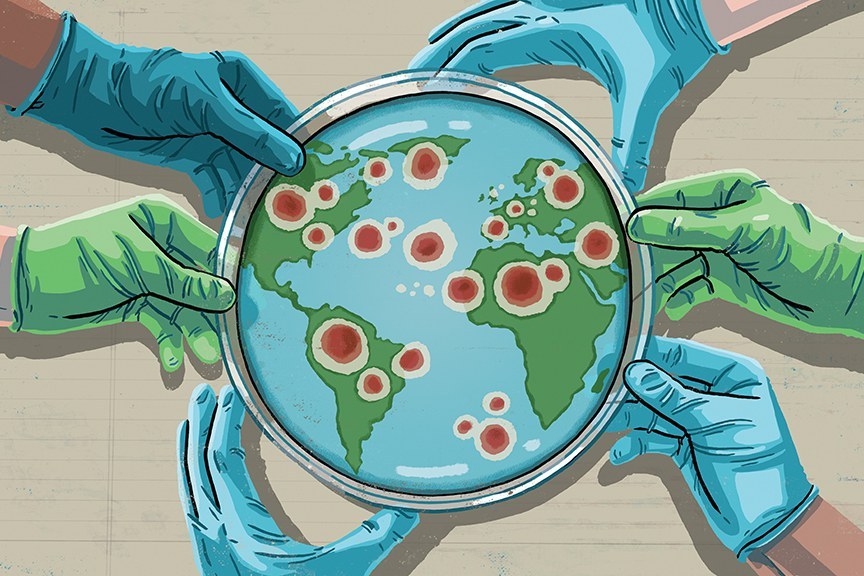Posted: January 9, 2025
Tackling antimicrobial resistance requires international collaboration.

Illustration: Eva Bee / Ikon Images
In a world where borders are increasingly porous, the battle against antimicrobial resistance knows no boundaries. As an immigrant deeply involved in the fight against antimicrobial resistance, I've witnessed the essential nature of international collaborations. The One Health concept, recognizing the interconnectedness of human, animal and environmental health, is the only effective approach to addressing the problem, emphasizing a global perspective.
Antimicrobial resistance is a global challenge. Bacteria resistant to antibiotics move through people, animals and the environment, making it an issue no single country can solve alone. This has driven my efforts to build partnerships worldwide, from Meru University in Kenya to the University of São Paulo in Brazil. These collaborations are about pooling resources, sharing knowledge, and learning from each other.
In Kenya, I saw opportunities to implement strategies from Brazil, such as crossbreeding cattle with native breeds and using cactus to feed dairy cows. These approaches, uncommon in the U.S., could benefit Kenya. Such insights highlight the unique perspectives different backgrounds bring.
One of the most rewarding aspects is witnessing the two-way flow of knowledge and benefits. In Kenya, our partnership has been transformative. We conducted workshops in DNA extraction and sequencing, learning from local experts about their challenges. Similarly, our work in Brazil has provided insights into successes and mistakes applicable in other contexts.
These relationships lead to mutual benefits. International partners gain access to advanced technologies and methodologies while we benefit from their unique perspectives and contextual knowledge. This synergy has led to innovative solutions that neither party could achieve alone.
A unique strength I bring is the ability to connect diverse groups — doctors, farmers, scientists, sociologists, veterinarians and government officials — in productive conversations. These interdisciplinary discussions are crucial to addressing big issues like antimicrobial resistance, climate change, food security and zoonotic diseases with a One Health mindset.
International collaborations aren't easy. Cultural differences, logistics and funding can be challenging. Open communication, flexibility and mutual respect are crucial to overcoming these hurdles. While virtual meetings are valuable, nothing replaces in-person interactions for understanding and advancing our shared goals.
Our goal is to expand these partnerships and deepen collaborative efforts. We're working on new projects addressing antimicrobial resistance in different environmental contexts and exploring potential collaborations within Penn State and institutions in Asia and Europe. Improving food production efficiency in low- and middle-income countries will likely positively impact methane emissions, contributing to global climate goals.
The fight against antimicrobial resistance is a marathon, not a sprint, and we need all hands on deck. By combining practical approaches with basic science, we can make a significant impact. Communication, setting expectations, inclusivity and mutual respect are essential. These collaborations are about creating a global community committed to a common cause.
By encouraging different sectors to work together with curiosity and a willingness to learn, we can make significant strides in advancing One Health and ensuring a healthier future for all. As I recently heard, "Share what you learn — and share what you wonder. You might find the answers in surprising places — all over the world." By finding the right people and building genuine relationships, we can turn the tide against antimicrobial resistance.
—Erika Ganda
Erika Ganda is an assistant professor of food animal microbiomes in Penn State's College of Agricultural Sciences. Her lab develops practical ways to leverage the microbiome to improve food safety and the efficiency of food production animals.
Features
Breaking the Silence on Farm Stress
Farming has always been a demanding profession, but today's farmers face unprecedented pressures that can severely impact their mental health.
Biting Back
Research Targets Vector-Borne Diseases to Save Lives
Leading Forward
Ott brings deep connection to role of dean.


